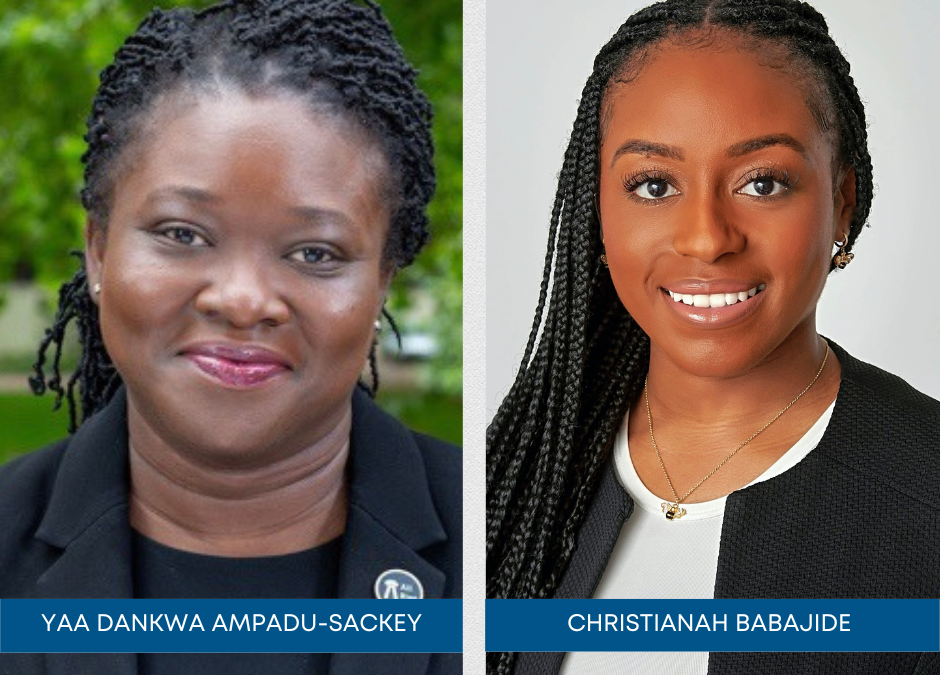
The Horse Hill Ruling: What Now for Fossil Fuel?
October 30, 2024
Top Legal Websites that Every Law Student Should Follow
November 1, 2024By Christianah Omobosola Babajide.
Reading time: seven minutes
In celebration of Black History Month, Christianah Omobosola Babajide had the pleasure of interviewing Yaa Dankwa Ampadu-Sackey (YDA-S), a Family Law Barrister at Four Brick Court. Yaa Dankwa’s practice focuses on children’s law matters, with an emphasis on modern families. She oversees surrogacy agreements and represents families seeking a parental order. She also appears in both public law cases, that is, cases where the local authority interferes with family life, and private law cases, that is, family law disputes between individuals.
COB: Let’s dive straight in. You have a unique approach to family law. What does this mean in the existing context of family law, and how did you develop this idea?
YDA-S: The make-up of family units has evolved. Modern families are different from the ‘traditional’ nuclear family set-up. They can include single-parent families, blended families, co-parenting, surrogacy, sperm donation, LGBTQ+ families, international families, and child-free families. Modern family structures can be complex and sometimes fluid, and the courts must keep up with these modern legal issues, such as disputes over contact between a child and a stepparent or stepsiblings and surrogacy and co-parenting disputes. I enjoy providing legal services such as advising and representing clients concerning the issues with these different family structures.
COB: Do you see yourself as a hindrance or a benefit in today’s legal field, and has this belief evolved?
YDA-S: As I was joining the legal profession, I heard stories about young parents’ difficulties securing continuing work due to competing interests in work and family life. I started out believing that my identity was a hindrance: a Black woman and a first-generation immigrant with a young family. When I started, I never talked about my children. I made myself available for every type of work as though my children did not exist. I sacrificed the time I could have had with my children’s formative years by handing them to different childcare professionals. I have no family in the UK, and I had not built any social networks I could rely on for childcare support.
Today, I share a different view due to the hard work of those who have gone before me in advancing the course for Black women and young parents. I am confident that my identity no longer remains a hindrance. Instead, it demonstrates how young Black women can persevere in such a traditional profession to excel and progress even with caring responsibilities.
COB: You studied History and Economics at university. What influenced your decision to study the GDL?
YDA-S: From a young age, I wanted to be a lawyer to make my parents proud. In the society where I grew up, family status’ is classified by their children’s successful careers. I looked at my family and realised that no one had joined the legal profession, and I decided that I wanted to be the first lawyer in my family. I envisioned wearing a wig and gown and standing up in court. After my first degree, I travelled to the UK and discovered that the lawyers who wear wigs and gowns in court were barristers, so the obvious route was to study for the GDL to achieve my dream of becoming a barrister.
COB: The Student Lawyer is a publication aimed at law students. What was the most valuable piece of advice you received at the beginning of your career, and who was the person who advised you?
YDA-S: I attended an Urban Lawyers event, where Ruth Ried and Mark Robinson were among the panellists who shared their journeys in the legal profession. Dr. Tunde Okewale OBE, who organised the event, talked about the power of networking. He stated that “your network is your net worth” and encouraged us to create meaningful networking relationships. This advice is the most poignant that has stayed with me to date, and I have experienced many successes just because of the networks I have built along the way.
COB: Similarly, what has been your mentorship experience within your career? How important is it to increase diversity and representation within the legal industry?
YDA-S: When I decided to return to work after my maternity leave, I felt lost and had no idea where to start. The late Paul Darling OBE KC, randomly sent me a LinkedIn connection request. I connected with him, and he immediately became my mentor upon my request. He took me under his wing and provided the road map I needed to reach the Bar finally. He was a genuine ally, which made the connection and the mentorship seamless.
Increasing diversity and representation is so important! It gives many aspiring barristers the hope that this profession truly welcomes individuals from all backgrounds. It is with that spirit that I am committed to giving back to the profession. I become a:
- Bar Council Social Mobility Advocate;
- a BSB Reverse mentor;
- a Judicial Office Reverse mentor;
- a mentor with the University of Birmingham (my alma matter);
- a mentor with Young Citizens Mock Trial; and
- a mentor with the International Future Barrister (a platform for international students who are aspiring barristers).
COB: As of 2024, according to the Judicial Diversity Forum, only 11% of judges are part of ethnic minority communities; an increase from 7% over the last decade. What are the advantages of a diverse bench?
YDA-S: The essential advantage of a diverse bench is visibility. We have a multicultural society, and the bench should, as much as practicable, reflect the society it serves. I represented a local authority in a public law family proceeding before a Black judge involving an ethnic minority family. At the end of the interim hearing, though the judge refused the mother’s application, she thanked the judge profusely, stating: “I know you understand my culture, and I accept your decision as being the best for my child.” The statement from the mother and many other statements I have heard give me the confidence that a more diverse judiciary would undoubtedly improve public trust and confidence in the justice system
COB: What steps can the legal industry take to encourage diversity in leadership positions?
YDA-S: All efforts to equip myself to become a professional leader have been my effort. However, the industry can do much more to encourage diversity in leadership by organising and supporting junior practitioners to attend leadership training seminars/courses with much emphasis on those belonging to marginalised groups.
COB: Since ‘reclaiming narratives’ is this year’s theme, are there any narratives you would like to reclaim?
YDA-S: Reclaiming the narrative that years of call is not commensurate to years of practice. Candidates often do not secure pupillage immediately after their call to the Bar, but this situation affects people of ethnic backgrounds more.
According to the Bar Council’s recent Pupillage Gateway Report, of the 288 offers recorded on the Pupillage Gateway, 60.8% went to White (British/English/Welsh Northern Irish/Scottish) compared with 10.4% to Asian/Asian British and 1.7% to Black/African/Caribbean/Black British.
I have had many setbacks, such as securing pupillage 12 years post-call, and it is crucial that, as a society, we relate to members of the profession in their years of practice. I find it very depressing when I am told, “I expect more from someone of your call,” because the person has assumed that my years of practice are equal to my years of practice.
Despite these setbacks, I have never felt that I do not belong, and I have continued to believe in myself. For those who accepted and supported me, I embraced their help, and for those who didn’t, I moved on and did not dwell on their negative outlook on me. Ultimately, I will encourage all Black women in law to be authentic, believe in themself and seek ways to work smart.
Quick-fire questions…
COB: What’s your favourite country in the world?
YDA-S: I have read a lot about Malta because it is my favourite country. I love its sandy beaches, architecture, and diverse culture.
COB: Who’s your favourite artist?
YDA-S: My favourite artist is Don Moen, who specialisesin Christian worship music. In 1994, I decided to become committed to the Christ faith (born again), and I fell in love with Don Moen’s songs and how they magnify the divinity of God.
COB: What do you do to relax after a long day of work?
YDA-S: I would watch an action or adventure movie on Netflix or listen to a podcast.
*Many thanks to TSL’s very own Reva Naidu for drafting the interview questions.





